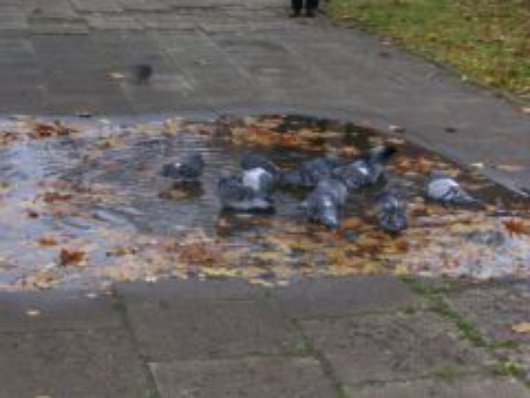European Parliament elections in Lithuania
Published on
By 2 pm, only 8.5% voters have expressed their opinion (or absence of such) in the European Parliament elections in Lithuania, which is not surprising at all. Voter turnout is always measured after 2 pm, as most voters are expected to vote after Sunday mass. Some politicians and others attribute low voter turnout to ugly weather that has been torturing the country for weeks.
 The typically poor condition of pavements and streets makes it somewhat meaningless to wet one's shoes. Yet people would do it if they believed in the cause.
The typically poor condition of pavements and streets makes it somewhat meaningless to wet one's shoes. Yet people would do it if they believed in the cause.
Firstly, as everywhere in Europe, people don't see how the EP changes their lives, although in fact it does. It's easy to see that most parties are trying to recycle their unpopular members this way. Secondly, the election campaign was dead boring. Everyone was repeating "We will defend the interests of Lithuania", although it's totally not their job. It's totally unclear what each party stands for. Most politicians on the list are either "recycled" corrupt and boring figures, or unknown people. So I think most people don't feel they have a choice and they're choosing anything (which is, actually, the point of having an election). It took some effort to convince my parents to vote today, and one argument in favour of voting that we all share was that it's better if one party gets least votes (I won't mention the name of that party, as the election is not yet over).
A worrying trend is that the most active voters are in the districts of Vilnius, Šalčininkai and Rokiškis. I don't know the situation of the latter, but predominantly Polish areas around Vilnius and Šalčininkai are, as I have read, notorious for vote-rigging. I generally welcome the existence of a Polish minority party, yet I've read many cases when this party was involved in convincing voters in rural areas to vote in advance or at home, which leaves more freedom for buying votes, as secrecy of voting is not always adequately ensured. Voting at home is an option for people who are seriously ill, but their list depends on the administrators of the election. In some constituencies over 90% of all voters chose the candidate of the Polish minority party during the recent presidential elections. During this election, there have been charges for vote-rigging in Šalčininkai, and the results of voting at home won't be valid.
It will be, hm, interesting if the Polish minority party gets in the EP (I wonder which faction they would join). They became famous as they pushed through a bill in the parliament calling for a ban on abortion in Lithuania. The leader of the party shows in his speeches that he wants more 'Christian' politics in Lithuania and more copying of "good practices" from Poland.



